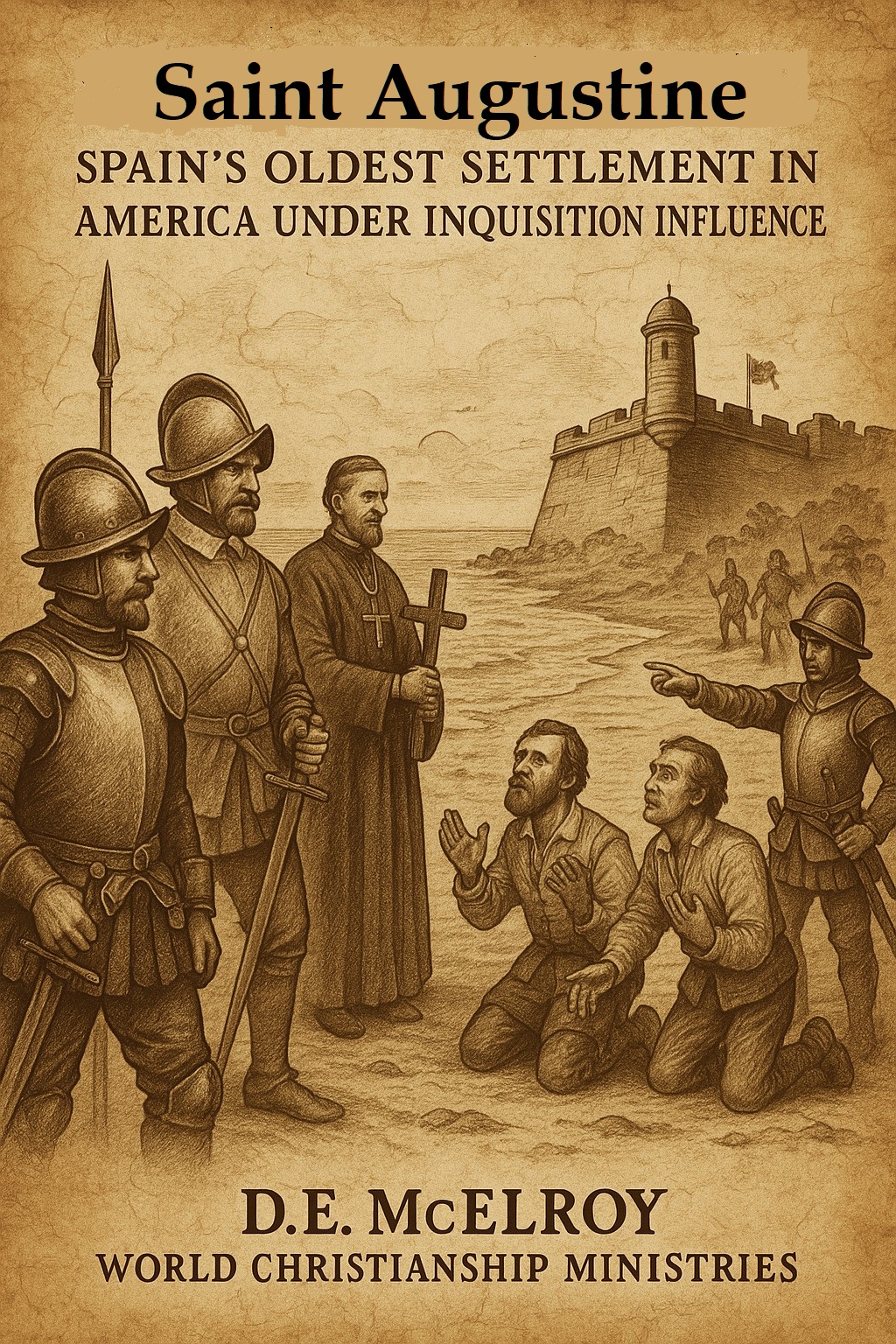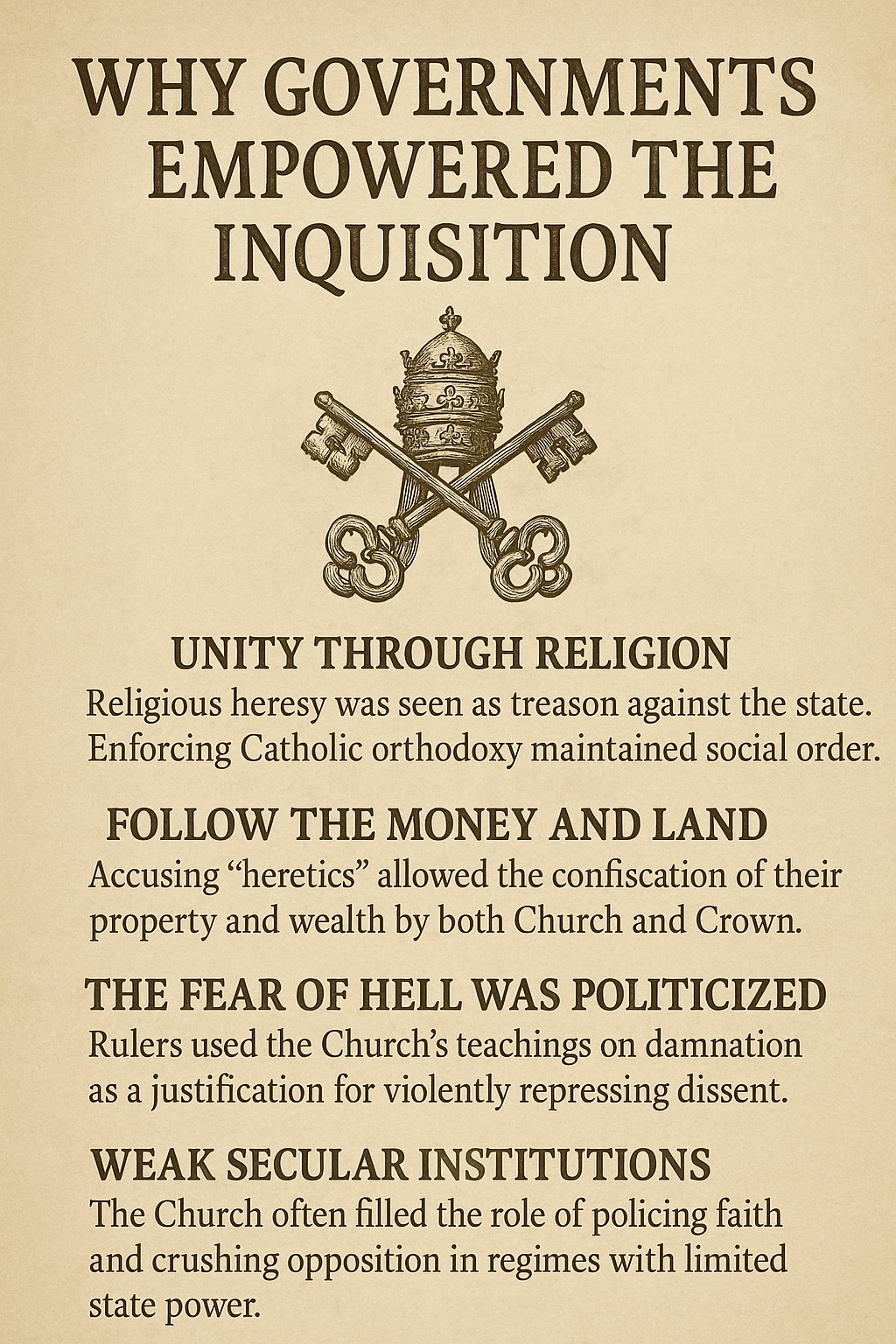concerning the Catholic Inquisition which lasted about 700 years.
St. Augustine, Florida, founded in 1565, was indeed established during the time of the Spanish Inquisition (1478–1834). While there is no known formal tribunal of the Inquisition ever set up in St. Augustine itself, Inquisition-era policies and religious attitudes absolutely influenced the governance, religious life, and social order of the town.
Here’s what history shows about the connection:
🔥 1. Spain’s Global Inquisition Reach
By 1565, Spain had already extended its empire into the Americas, and the Spanish Inquisition was actively functioning in Spain, Mexico, and other colonies. The Holy Office of the Inquisition was officially established in New Spain (Mexico City) in 1571, and its influence radiated outward into Spanish territories, including La Florida (which included present-day Florida and much of the southeastern U.S.).
Even if St. Augustine didn’t have its own tribunal:
-
Priests and colonial officials carried Inquisition ideals with them—especially strict enforcement of Catholic orthodoxy.
-
Blasphemy, heresy, and suspicion of crypto-Judaism or Protestantism were not taken lightly.
-
All settlers were expected to be practicing Catholics, and indigenous peoples were subjected to missionary efforts framed by Inquisition-era dogma.
⛪ 2. Founding by Men Under Inquisition Influence
St. Augustine was founded by Pedro Menéndez de Avilés, a staunch Catholic and Spanish naval officer who saw his mission not only as military colonization but also religious conversion. He worked closely with Jesuit missionaries, who were aligned with the Catholic Church's efforts to combat heresy and convert indigenous people—both goals consistent with the spirit of the Inquisition.
⚔️ 3. Martyrdom and Religious Intolerance
One direct reflection of Inquisition attitudes occurred in 1566–1567, shortly after the town's founding:
-
Menéndez de Avilés executed a group of French Huguenots (Protestants) at Fort Caroline (near modern Jacksonville), proclaiming, "I do this not as to Frenchmen, but as to heretics."
-
Over 100 Protestants were killed. This was not an official Inquisition act, but it reflected Inquisitional religious intolerance carried out on colonial soil.
👥 4. Control of Books and Beliefs
Like other Spanish colonies, St. Augustine likely followed Inquisition guidelines on banned books and ideas:
-
Books had to be approved by Church censors.
-
Any suspicion of heresy or unorthodox religious practice could result in punishment—at least ecclesiastically, if not via tribunal.
-
Settlers were required to publicly practice Catholicism, and apostasy or religious deviation was unthinkable.
🌐 5. No Tribunal, But Religious Surveillance
Unlike Mexico City, Lima, or Cartagena (Colombia), St. Augustine did not host an Inquisition court, but the town's church hierarchy and government acted as local enforcers of Catholic orthodoxy. In many ways, the Church functioned as an extension of the Inquisition’s values without the formal structure.
Summary:
While there was no formal Spanish Inquisition tribunal in St. Augustine, the mindset and laws of the Inquisition were very much present:
-
Protestantism was suppressed.
-
Catholic orthodoxy was enforced.
-
Indigenous people were converted under pressure.
-
Heresy and dissent were unthinkable in public life.
St. Augustine may be better known today for its charming Spanish colonial architecture, but in its early decades, it was a militarized Catholic outpost governed by the same forces of fear, conformity, and religious control that defined the broader Spanish Inquisition.
WCM International Music Page Sins Page Animal Lovers Page Our Earth Today Page NDE-Near Death Experience Page

